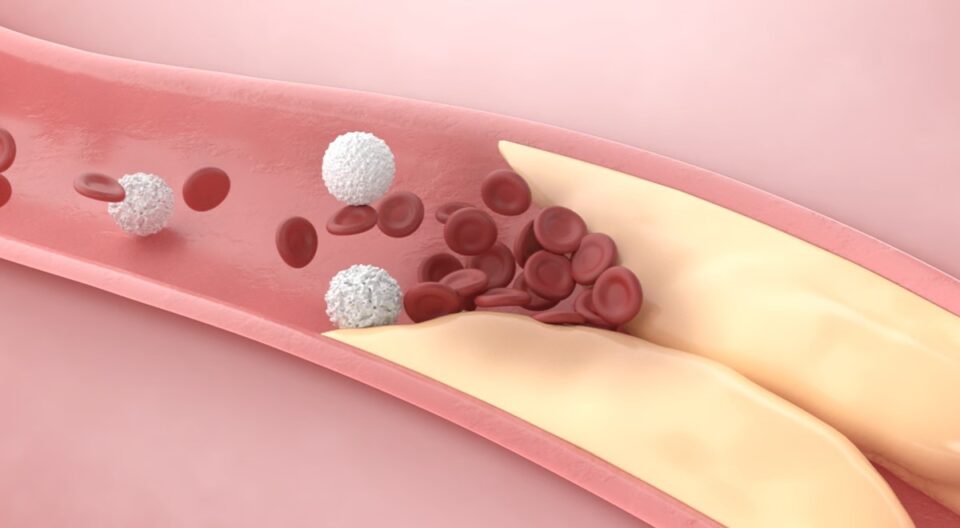There are additional risk factors for atherosclerosis. So obesity is the most noticeable and manageable. Therefore, this article will discuss the intricate link between obesity and atherosclerosis, how obesity increases it, and how to prevent it.
Comprehensive Atherosclerosis Overview
Firstly, understanding the foundations of atherosclerosis formation is essential before discussing obesity and the illness.
In early Atherosclerosis, the endothelium—the artery lining—is compromised. Inflammation, smoking, high cholesterol, and hypertension may cause this. Damage triggers the body’s healing process. A repair kit with white blood cells and other ingredients is given to the wounded region.
However, cholesterol, cellular debris, calcium, and other substances surrounding the injury may cause problems. Over time, these deposits consolidate as plaque. Plaque constricts arteries, cutting down blood flow. Finally, a plaque rupture or blood clot may cause a heart attack or stroke.
Obesity and Atherosclerosis: A Complex Relationship
Obesity causes and advances atherosclerosis via multiple pathways:
Lipid deficiencies
As obesity progresses, “bad” cholesterol (LDL) and triglycerides rise while HDL falls. Various lipid disorders increase the risk of arterial plaque.
Metabolic diabetes
Cells that resist insulin are closely associated to fat. So, insulin resistance raises blood sugar and forms atherogenic particles that may obstruct arteries.
Chronic inflammation
Being overweight promotes chronic low-grade inflammation. Now again, inflammation causes inflammatory cells to stick to arterial walls, causing plaque development.
Hormones change
Overweight persons may have imbalances in metabolic and cardiovascular health hormones such adipokines, leptin, and adiponectin. Hormonal changes may affect inflammation. Therefore, that is true for endothelial dysfunction, and plaque formation.
Obesity increases free radical production, which damages cells, causes inflammation, and promotes plaque. Oxidative stress occurs.
Reduce Atherosclerosis: Break the Chain Obesity Danger:
Overweight raises the risk of atherosclerosis, although lifestyle adjustments may lower it. Lifestyle changes and good habits may break the obesity-atherosclerosis relationship. Now, following these established techniques may minimize obesity-related atherosclerosis risk:
Losing Weight
Maintaining a healthy weight matters. Even a little weight loss may improve cardiovascular health. Therefore, a successful weight reduction regimen includes regular activity and a balanced diet.
Eating Well
A heart-healthy diet includes fruits and vegetables. Then there are the whole grains, lean meats, and healthy fats. So, reduce sugar, processed foods, saturated and trans fats.
Working out
Exercise regularly. At least two days a week, muscle-strengthening activities and 75 minutes of vigorous or 150 minutes of moderate aerobic activity are necessary.
The FDA
Overweight adults with atherosclerotic risk factors may benefit from blood sugar, cholesterol, and blood pressure medications. Then, see a doctor or nurse for customized guidance.
Giving Up Cigarettes
Stopping smoking is crucial. So, quitting smoking dramatically reduces cardiovascular disease and atherosclerosis risk.
Reducing Stress
Chronic stress worsens weight gain and poor diet. Therefore, relax your body and mind with yoga, deep breathing, meditation, and mindfulness.
Improve Sleep Quality
Consider sleep apnea if problems persist. Discuss your symptoms and treatment options with your doctor, such as lifestyle changes or CPAP.
Clinic-monitored weight loss
For people who are exceedingly obese or have failed to lose weight via behavioral changes, bariatric surgery or medically supervised weight loss programs may be considered.
Conclusion
Given the rising worldwide obesity rate, the relationship between atherosclerosis and the illness is crucial for public health. Understanding their complex relationship is essential to treating and preventing these two illnesses. Obesity increases atherosclerosis risk via lipid abnormalities, inflammation, insulin resistance, and oxidative stress.

